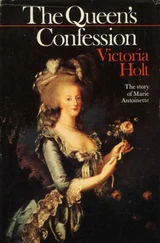Виктория Холт - Queen Jezebel
Здесь есть возможность читать онлайн «Виктория Холт - Queen Jezebel» весь текст электронной книги совершенно бесплатно (целиком полную версию без сокращений). В некоторых случаях можно слушать аудио, скачать через торрент в формате fb2 и присутствует краткое содержание. Жанр: Исторические любовные романы, на английском языке. Описание произведения, (предисловие) а так же отзывы посетителей доступны на портале библиотеки ЛибКат.
- Название:Queen Jezebel
- Автор:
- Жанр:
- Год:неизвестен
- ISBN:нет данных
- Рейтинг книги:4 / 5. Голосов: 1
-
Избранное:Добавить в избранное
- Отзывы:
-
Ваша оценка:
- 80
- 1
- 2
- 3
- 4
- 5
Queen Jezebel: краткое содержание, описание и аннотация
Предлагаем к чтению аннотацию, описание, краткое содержание или предисловие (зависит от того, что написал сам автор книги «Queen Jezebel»). Если вы не нашли необходимую информацию о книге — напишите в комментариях, мы постараемся отыскать её.
Queen Jezebel — читать онлайн бесплатно полную книгу (весь текст) целиком
Ниже представлен текст книги, разбитый по страницам. Система сохранения места последней прочитанной страницы, позволяет с удобством читать онлайн бесплатно книгу «Queen Jezebel», без необходимости каждый раз заново искать на чём Вы остановились. Поставьте закладку, и сможете в любой момент перейти на страницу, на которой закончили чтение.
Интервал:
Закладка:
‘The help of Châtillon would seem small, when the help of France had been promised.’
‘You are right, my son; but if France fails to keep her word, Châtillon must not do likewise.’
‘I have had warning letters from friends at court. Father, they beg us not to go. The Guises plot against us, and the Queen Mother plots with the Guises.’
‘We cannot stay away because of warning letters, my son.’ ‘We must take great care, sir.’
‘Rest assured we will.’
At the communal meal nothing was said of the departure, but, from Jacqueline and Gaspard at the head of the table to the servants at the other end, all were thinking of it. Gaspard was greatly loved throughout the neighbouring countryside, for all were aware that there was food for any who needed it at the Château de Châtillon; it was the Admiral himself who had instituted these communal meals which began with a psalm and were followed by grace.
Gaspard was now thinking, as he sat down at the long table, of the struggle which lay before him and those men who were pledged to help him. There was the young Prince of Condé, so like his gay and gallant father who had died fighting for the cause; but the young Prince, for all his valour, was scarcely a strong man. There was the young King, Henry of Navarre, who, at nineteen, was a brave enough fighter but a light liver, a man who thirsted after pleasure rather than righteousness. He could not resist the blandishments of women; he was fond of roystering, of good food and drink; he was too gay a Prince to devote himself to a religious cause. Téligny? It was not because he was so closely related that Gaspard’s hopes rested in that young man. In Téligny Gaspard recognized his own determination, his own devotion. There was also the Duc de la Rochefoucauld, dearly beloved of King Charles; but he was young yet and untried. There was the Scot, Montgomery, whose lance had accidentally killed King Henry the Second. Montgomery was the man who would probably lead the Huguenots if death overtook the Admiral, but he was no longer young, and it was among the young that they must look. In the natural course the leadership would fall to the young King of Navarre.
It was foolish to think of his own death; it was the frightened glances of his family and friends which had sent his thoughts in that direction. Even the servants threw fearful glances at him. They were all silently begging him to ignore the dispatches, to refuse to obey the command of the Queen Mother.
Only Téligny was unafraid; and Téligny knew, as the Admiral knew, that they must leave as soon as possible for the court.
Gaspard talked; he talked lightheartedly of the coming marriage, which was not merely the union of a Catholic Princess and a Protestant Prince but, he hoped, the union of all Catholics and Protestants throughout France.
‘If the King and the Queen Mother were not ready to favour us, would they have wished for this marriage? Has not the King himself said that if the Pope will not give the dispensation, the Princess Marguerite and King Henry shall be married en pleine prêche? What more could he say than that? He is our friend, I say. He at least is our friend. He is young and he is surrounded by our enemies; but when I go to court I shall be able to assure him of the righteousness of our cause. He loves me; he is my dear friend. You know how I was treated when I was last at court. He consulted me on all matters. He called me Father. He wishes to do good and he wants peace in the kingdom. And, my friends, do not doubt that I will help him to attain it.’
But there were murmurings along the table. The Italian woman was at court, and how could she be trusted? The Admiral had forgotten how at one time she had set one of her spies to poison him when he was in camp. That might easily have been accomplished. The Admiral was too forgiving, too trusting. One did not forgive, nor did one trust, a serpent.
Etienne, one of the Admiral’s grooms, wept openly. ‘If the Admiral leaves us he will never return to us,’ he prophesied.
His fellows stared at him in horror, but he persisted in his gloomy prognostications. ‘She will succeed in her evil plans this time; evil will triumph over good.’
He was silenced, but he sat there dropping tears into his cup.
When the cloth was removed one of the ministers—there were usually one or two at the Admiral’s table—gave the benediction. Then the Admiral and his son-in-law shut themselves up together to talk of their plans and to prepare dispatches which must be sent to court to announce their coming.
When they rode out a few days later,Étienne was in the stables. He had been waiting there since early morning, and when the Admiral mounted his horse, he flung himself on his knees and wailed like one possessed.
‘Monsieur, my good master,’ he implored, ‘do not go to your ruin, for ruin awaits you in Paris. If you go to Paris you will die there . . . and so will all who go with you.’
The Admiral dismounted and embraced the weeping man.
‘My friend, you have allowed evil rumours to upset you. Look at my strong arm. Look at my followers. You must know that we can take care of ourselves. Go to the kitchens and tell them they are to give you a cup of wine. Drink my health, man, and be of good cheer.’
He was led away, but he continued to mourn; and the Admiral, riding with his son-in-law to Paris, could not dismiss the scene from his thoughts.
Having dismissed Charlotte de Sauves, Catherine de’ Medici gave herself up to reflection. She had no definite plans yet for the young King of Navarre, but she guessed that it would be well to have Charlotte working upon him as soon as he arrived; it would not be advisable for him to make a prior attachment which might prove a stronger one than that which she intended to forge. She was sure that Henry of Navarre was another such as his father, Antoine de Bourbon—a man to be ruled by women; and she was determined that the woman who ruled her, prospective son-in-law should be her spy. He must not be allowed to fall in love with his bride. That was hardly likely, since Margot would be as ungracious as she could, and Henry of Navarre, who had never lacked admirers, was not likely to fall in love with a wife who spurned him. But she could not trust Margot. Margot was a schemer, an intriguer, who would work for her lover rather than for her family.
As she sat brooding, her son Henry came into the room. He came unannounced and without ceremony. He was the only person at court who would have dared to do that.
She looked up and smiled. Tenderness sat oddly on her face. The prominent eyes softened, and the faintest colour shone beneath her pallid skin. This was her beloved son; and every time she looked at him she was irked by the thought that he was not her first-born, for she longed to take the crown from his brother and place it on that dark, handsome head.
She had loved Henry her husband through years of neglect and humiliation, and she had called this son after him. It was not the name which had been given to him at his baptism; that was Edouard Alexandre; but he had become her Henri; and she was determined that one day he should be Henry the Third of France.
Francis, her first-born, was dead; and when he had died she had wished fervently that Henry might have taken the crown instead of mad ten-year-old Charles. It was particularly irritating to reflect that there was a year between their births. Why, she had so often asked herself, had she not borne this son on that June day in 1550! If that had been so she would have been spared many an anxious moment.
‘My darling,’ she said, taking his hand—one of the most shapely in France and very like her own—and carrying it to her lips. She smelt the scent of musk and violet powder which he brought into the room. He seemed the most beautiful creature she had ever seen, in his exaggeratedly fashionable coat of mulberry velvet slashed to show pearl-grey satin; the border of his linen chemise was stiff with jewels of all colours; his hair was curled and stood out charmingly beneath his small jewelled cap; his long white fingers were scarcely visible for the rings which covered them; diamonds sparkled in his ears and bracelets hung on his wrists.
Читать дальшеИнтервал:
Закладка:
Похожие книги на «Queen Jezebel»
Представляем Вашему вниманию похожие книги на «Queen Jezebel» списком для выбора. Мы отобрали схожую по названию и смыслу литературу в надежде предоставить читателям больше вариантов отыскать новые, интересные, ещё непрочитанные произведения.
Обсуждение, отзывы о книге «Queen Jezebel» и просто собственные мнения читателей. Оставьте ваши комментарии, напишите, что Вы думаете о произведении, его смысле или главных героях. Укажите что конкретно понравилось, а что нет, и почему Вы так считаете.












